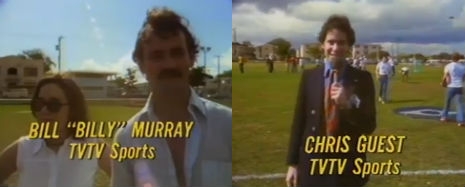
The pithiest comment ever made about the Super Bowl came from a player who was famous for not talking to reporters—Cowboys’ running back Duane Thomas, who said in the early 1970s, “If the Super Bowl is the ultimate game, how come there is another one next year?” As of last Sunday, the matchup for Super Bowl XLVIII, to be held, bizarrely, in frosty East Rutherford, New Jersey, is set: it will be the Denver Broncos against the Seattle Seahawks. It’s been widely noticed that the home states of the two teams are the ones that have pursued marijuana legalization the farthest, so we appreciate the positive advertisement of the general salubriousness of reefer.
Thirty-eight years ago, the film collective TVTV sent noted sports fan Bill Murray and noted deadpan satirist Christopher Guest down to Miami, Florida, to cover Super Bowl X, between the Dallas Cowboys and the Pittsburgh Steelers, in order to help with a loose, impressionistic documentary about all the hoopla. In an article about the documentary posted by Deadspin a year ago, TVTV honcho Allen Rucker explained why the collectives’ techniques were so ground-breaking:
In 1976, no videomakers had ever walked into a pro football locker room and hung out with the players. No videomakers had ever invited the players to drop by their own hangout—in TVTV’s case, a rented mansion that could communally house 30 or 40 counterculture types making the program. No videomakers had ever had the idea of giving a player his own portable video unit for a night to go back to the off-limits player dormitory and shoot whatever he wanted.
Amusingly, according to Rucker, Newsweek had labeled those very “counterculture types” a bunch of “braless, blue-jeaned video freaks.” Mercy me!!
Given all the emphasis on the shaggy, guerrilla tactics of the TVTV crew, the resulting documentary is surprisingly gentle, which certainly constitutes a strength. In honored vérité style (Fred Wiseman was still very big back then), there’s no commentary at all; the doc is a loosely connected series of clips on various themes, including “Steeler Wives,” “Sports Facts” (that one is, subversively, about the players’ union), “Fans,” “Super Sunday,” and so on. To its credit, TVTV’s approach was not to lecture but to soak all the craziness in.

Murray and Guest were on hand to ... er, “commentate” a curious game of touch football, billed as “Super Bowl IX 1/2,” involving a passel of former greats, including Sonny Jurgensen, Johnny Unitas, and Paul Hornung. Compared to their current statures, Murray and Guest were essentially unknown in 1976. Murray’s debut on SNL came a year later, almost to the day (January 15, 1977), whereas Guest, known at that time primarily as a National Lampoon writer and actor, would have to wait until 1984’s This is Spinal Tap for his big boost in exposure. If you want maximum Bill Murray, you’re going to want to watch Part 2 of the four videos. The interface between the counterculture and establishment culture may be most evident in that section: Murray’s innocent question to Phyllis George about which player she’d like to date induces an exasperated response about “sexist questions”: in other words, she doesn’t entirely realize that Murray is basically joking and that the stakes aren’t all that. Hilariously, Murray gets Pat Summerall, who was well on his way to becoming an axiom of CBS’ football coverage for a generation, to say, “I think there’s too much damn television, don’t you?”
The vaguely workers-oriented stance of the doc is its most interesting aspect—not just Colts owner Robert Irsay’s inane antics in which he likens the head of the players’ association to a babbling monkey but also the comments of Aleta Bleier, wife of Steeler’s halfback Rocky, on the physical and economic sacrifices the players make: “It’s a hell of a big business! Who’s gonna make all that money, the players, or—does Dan Rooney [president of the Steelers] deserve to make $5 million or does your husband [Becky Clack, wife of Jim Clack] deserve to make $30,000 instead of $18,000?” Right at that moment in baseball, the players were securing their fair share of the income, a process that would occur somewhat later for pro football players. Today all the athletes make plenty of money, and the moral force of Aleta’s argument is not something you’d be as likely to encounter today.
Oh yeah—the Steelers won that one, 21-17.
Previously on Dangerous Minds:
Super Bowl Sunday with Ronald Reagan, 1985 (plus video!)
Leadbelly at the Super Bowl but nobody notices